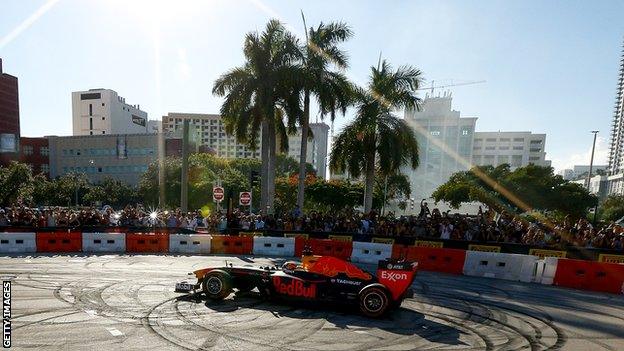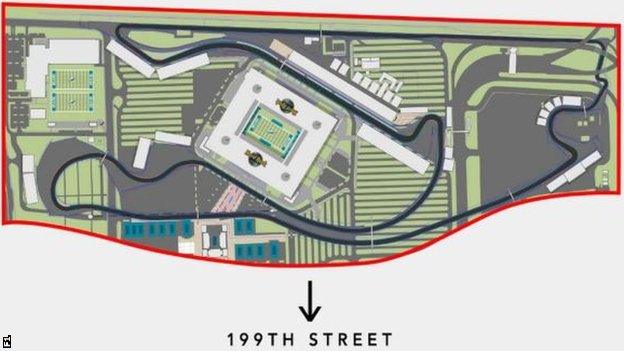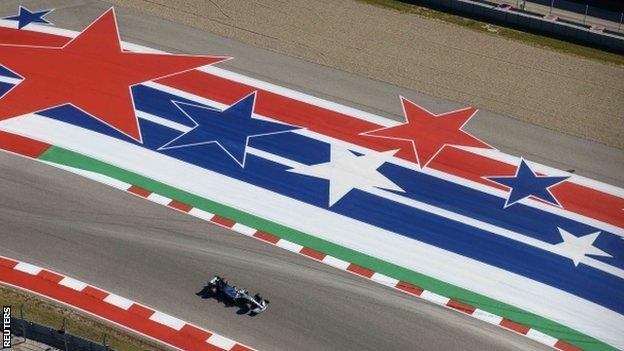Miami Grand Prix: Formula 1 makes further changes to plans for Florida race
- Published

Red Bull took part in an F1 festival in Miami in October 2018
Formula 1 has made further changes to its plans for a Miami Grand Prix in the hope of overturning objections to the race from locals.
F1 was forced to abandon the original location for the race, which was in the downtown area and over a bridge.
But the latest attempt to secure a deal for a race around the Miami Dolphins' NFL stadium has also hit snags.
The changes come before a crucial meeting of Miami-Dade county commissioners on Wednesday.
At that meeting, commissioners will vote on a proposal to change the stadium's zoning rights and withdraw its rights to hold motor racing, which would have the effect of preventing the grand prix from taking place.
F1 has been consulting residents and various stakeholders in Miami as it seeks to persuade locals to back the grand prix.
Those talks have led to another new track configuration, and alters the race weekend schedule so there is no on-track action before 15:00 local time on the Friday of the race weekend, to avoid disrupting local schools.
F1 said in a statement, external it had "provided substantial scientific evidence proving there are no credible health threats to local residents caused by the racing".
It added: "However, a primary concern voiced by residents related to the use of a stretch of Northwest 199th Street for a portion of the racetrack and the disruption it would cause to local traffic on 199th Street."

A map of the new proposed track for the Miami Grand Prix was released on Tuesday
Tom Garfinkel, the Miami Dolphins and Hard Rock Stadium vice-chairman and CEO, said: "Like the Super Bowl, an event like this provides a unique opportunity to proudly showcase our region to the world. We want these events to benefit everyone in the region, including local Miami Gardens residents."
The developments on Tuesday are the latest steps in a long-running saga as F1 seeks to establish a race in what departing commercial boss Sean Bratches calls a "destination city" in America.
Bratches, one of three senior executives appointed when US group Liberty Media took over the sport in 2017, leaves his post at the end of this month and will not be directly replaced.
F1 chairman and chief executive Chase Carey said at the Abu Dhabi Grand Prix at the end of last season the sport had other possibilities in America if Miami fell through.
Carey said: "We are engaged in other opportunities in the US and that's not a negative statement about Miami. We are in the final stages of getting over the line or not. We have the luxury of demand that exceeds supply."
One of the other possibilities is known to be Las Vegas, where F1's former boss Bernie Ecclestone sought on and off for nearly 30 years to hold a race on a track that includes the famous strip but never managed to pull it off.
Ecclestone also failed in his attempts in the last decade to secure a race in New Jersey overlooking the Manhattan skyline.

Lewis Hamilton clinched his sixth world title with second place at last year's US Grand Prix
F1 already has one race in America - the popular and successful US Grand Prix at the Circuit of the Americas in Austin, Texas.
But Liberty is determined to establish at least one further race in the States as F1 seeks to strengthen its position in a marketplace where it has for decades struggled to break through into the national consciousness.
Carey has said he would also like to have a race in Africa, and F1 is also looking for a second race in China to add to the existing Chinese Grand Prix in Shanghai.
This year, the calendar features two new races - one, the revival of the Dutch Grand Prix at Zandvoort, which was last held in 1985, and another the inaugural race in Vietnam, to be held in the capital Hanoi.
That takes the schedule to a record 22 Grands Prix, but new rules now give Liberty the option to extend the calendar to as many as 25 races.
Many teams are not keen on expanding the calendar further - some feel it is already too long - and there have been warnings about the risks of damaging F1's exclusivity by holding too many races.